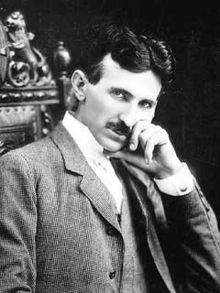Nikola Tesla
 Nikola Tesla was born exactly at midnight on July 10, 1856 in the tiny village of Smiljan, Lika in Croatia. In his late teens, Tesla left the village to pursue a career in electrical engineering. He started attending the Austrian Polytechnic in Graz, but never graduated and cut off all ties with his friends and family shortly after the start of his third year. He disappeared for awhile and suffered a nervous breakdown before being found and convinced by his father to attend Charles-Ferdinand University in Prague. However, he stayed for only one term, leaving after his father died.
Nikola Tesla was born exactly at midnight on July 10, 1856 in the tiny village of Smiljan, Lika in Croatia. In his late teens, Tesla left the village to pursue a career in electrical engineering. He started attending the Austrian Polytechnic in Graz, but never graduated and cut off all ties with his friends and family shortly after the start of his third year. He disappeared for awhile and suffered a nervous breakdown before being found and convinced by his father to attend Charles-Ferdinand University in Prague. However, he stayed for only one term, leaving after his father died.
After working for a telegraph company in Budapest, Tesla made his way to France in 1882. There he developed one of his greatest discoveries, using the rotating magnetic field forming the basis for alternating current (AC) machinery. He built the first induction motor, which more than a hundred years later is still the preferred type of motor for industrial use.
In 1884 he moved on to the United States to work for Thomas Edison. Tesla worked hard to redesign Edison's motors, developing several important patents for the company before quitting over a salary dispute when Edison refused to raise his salary from $18 per week to $25. Tesla and Edison would remain enemies for the rest of their lives.
Tesla's next step was to begin work on X-rays using single vacuum tubes. He also created machines testing mechanical resonance, inducing sleep, bladeless turbine engines, cordless gas lamps, the first spark plugs, the first ever radio transmitter (though the patent was later given to Marconi), and wireless electromagnetic energy transmitters. He was considered for the Nobel Prize on several occasions.
Tesla was the classical mad scientist. He was seen by his contemporaries as a man who believed in things that couldn't be done. Tesla died of heart failure in early January 1943 at the age of 86.
Related Links